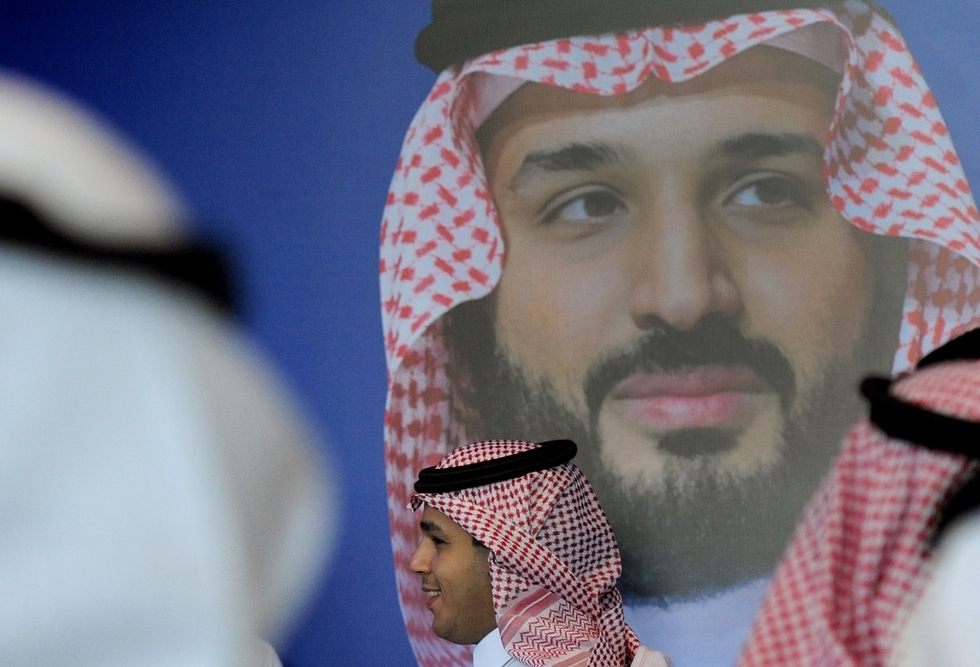Sanitising bin Salman: How Western media whitewash Saudi violence at home and abroad

Misleading coverage of recent actions taken by the government of Saudi Arabia has been widespread. Commentary on Crown Prince Mohammad bin Salman's (MBS) purge and his moves against Lebanon and Iran has tended to obfuscate the Saudi state's domestic repression, sectarianism, and warmongering, while obscuring the role of the United States and its allies in Saudi moves.
A wide section of media coverage is characterised by a whitewashing of the horror that Saudi Arabia, America, the UK, and their partners, have inflicted in their war on Yemen
Much of the coverage propagates the idea that the steps Prince Bin Salman has taken are necessary, though perhaps harsh, efforts to change Saudi Arabia for the better. Often this praise is not only for the actions he’s taken in the last week and a half but also for what he has done in the longer-term.
A gloss over brutality
The headline of a Patrick Wintour article in The Guardian describes the crown prince as "a risk-taker with a zeal for reform". The author goes on to describe the purge as part of a larger "cultural and social revolution" and he repeats the "revolution" claim a second time.
In The New York Times, Thomas Friedman says, "I've interviewed MBS twice….I’ve found his passion for reform authentic, his support from the youth in his country significant and his case for making radical change in Saudi Arabia compelling….And if he did not exist, the Saudi system would have had to invent him. Somebody had to shake up the place."
Such favourable reviews gloss over the brutality of the Saudi government's conduct since MBS's palace coup in June. In July, Saudi authorities sealed off the Shia town Awamiya. The state escalated its repression of Awamiya residents who were angered by government plans to demolish the Musawara neighbourhood. Government violence was driven by "anti-Shia bias," according to a researcher at Human Rights Watch.
Amnesty International reports that from July to October the Saudi state put 60 people to death, "an execution spree with an average of five people put to death per week," in the words of Amnesty's Middle East director of research, Lynn Maalouf.
The organisation says that many of the people Saudi Arabia sentences to death and executes are denied fair legal process and often convicted entirely on the basis of "confessions" extracted under torture. As Maalouf points out: "The Saudi authorities have been using the death penalty as a tool to crush dissent and rein in minorities with callous disregard for human life." But you wouldn't know that from most of what's published in the western commentariat.
Fomenting blood and misery
The writing on recent Saudi machinations is also characterised by a widespread failure to criticise such sectarianism or its aggressive international moves though Friedman does touch on these. Arch neoconservative Dov Zakheim even amplifies Saudi sectarianism in Foreign Policy when he claims that "Iranian influence . . . now really does manifest itself as the Shiite crescent." Later he bemoans Iran's alleged "support for instability throughout the region".
Robert Fulford also volunteers to be a megaphone for sectarian talking points when he claims that:
"Iran has been free to establish itself through its terrorist connections as a leading power in the region. Hezbollah, the Iran supported Shia Islamist terror faction, is so well situated in Lebanon that it has representatives in the national parliament and enough seats in the cabinet to veto any legislation. The Saudis have mainly ignored Iran's progress, but now it seems that they have recognised this threat and decided to oppose it."
Thus Fulford, who spends much of his article huffing and puffing about democracy but demonstrates his contempt for it by whining about Lebanese people who voted for Hezbollah, endorses the Saudi government's dangerous escalation of its hostility to Iran and Lebanon.
Neither Zakheim nor Fulford offer evidence for their accusations against Hezbollah or Iran and both authors fail to describe the Saudi state’s extensive role in fomenting bloodshed and misery beyond its borders.
Indeed, a wide section of media coverage is characterised by a whitewashing of the horror that Saudi Arabia, America, the UK, and their partners, have inflicted in their war on Yemen.
The country is facing what the UN calls the "fastest growing cholera epidemic ever recording," with 895,000 such cases, a disaster in which America and the UK have played a "crucial role," according to a group of medical researchers. Seven million people in Yemen, roughly a quarter of the population, are on the brink of famine while a total of 17 million in the country are food insecure.
As of January, the civilian death toll was 10,000 people, with a further 40,000 wounded. Elliot Abrams doesn’t even mention the war on Yemen in his analysis of Saudi Arabia for the Times.
While the Times’ editors criticise Prince Mohammed Bin Salman's purge and warn against US-Saudi escalation against Iran, the paper simply mentions the Yemen war without criticising the conduct of Saudi Arabia and its allies.
The US-UK war on Yemen
In Newsweek, Miriam Eps describes Saudi policy in Yemen as "controversial and impactful". Because of the war, 18.8 million Yemenis are currently in need of humanitarian assistance: "impactful" is right. Later in Eps' article, she calls Saudi Arabia’s role in the war on Yemen "costly" but she’s referring to the costs to Saudi Arabia rather than, say, the costs being born by the two million persons displaced in Yemen or the 188,327 people who have fled the country to neighbouring nations.
Fulford, similarly, says that Yemen "turned into [a] failed stat[e]" as though that happened by some indecipherable mystery.
While Wintour correctly describes the Saudi war on Yemen as "brutal," he fails to mention that the war is also an America and British one, as does the Times editorial, which calls it a proxy war between Iran and Saudi Arabia.
No analysis of Saudi actions is complete unless it accounts for how these take place in the context of its "special relationship" with Washington
Yet in the first half of 2017 alone, Britain sold £1.1bn in military equipment to the Saudi state. The US sold $1.3bn in arms to the Saudi government in 2015 with the express purpose of restocking munitions used in Yemen and sold the Saudis $58bn worth of arms between 2009 and 2015.
Since the earliest phases of the Saudis' Yemeni bombing campaign, the US has been sharing intelligence with the Saudis. Throughout the war the US has refuelled the Saudi jets used to bomb Yemen, doubling its supplies in the months following a Saudi strike that killed 140 people at a funeral. Furthermore, American and British military personnel are in the command room for the Saudi strikes on Yemen.
In addition, the Saudi government worked with the US to fuel the war in Syria, blockaded Qatar, and seems to have compelled the Lebanese prime minister to resign. Saudi Arabia then recalled its citizens from Lebanon and said that Lebanon declared war against it, both of which can be seen as thinly veiled threats that Saudi Arab is considering a military attack on Lebanon.
No analysis of Saudi actions is complete unless it accounts for how these take place in the context of its "special relationship" with Washington but, of the articles I've been discussing, only Zakheim addresses the subject in any detail.
The US is the vastly more powerful party in this partnership, which is grounded in petrodollars and weapons sales.
An alliance of the US, Saudi Arabia, and Israel - all disappointed that the Syrian government and its partners appear to have defeated their proxies in the war in that country - is intent on weakening if not outright destroying Hezbollah and Iran. They also aim to normalise Israel's dispossession and oppression of the Palestinians so that Saudi and Israeli power under the auspices of the US empire will be unchallenged in the region.
If people living in Britain, Canada and the US understand that their ruling classes are partnering with Saudi Arabia to carry out extreme violence and oppression, these states can be stopped. But their media has erected a barrier to that.
- Dr Greg Shupak is an author and activist who teaches Media Studies at the University of Guelph in Canada.
The views expressed in this article belong to the author and do not necessarily reflect the editorial policy of Middle East Eye.
Photo: Saudi men chat in front of a poster of Saudi Crown Prince Mohammed bin Salman during the "MiSK Global Forum" held under the slogan "Meeting the Challenge of Change" in Riyadh, on November 15 2017 (FAYEZ NURELDINE/AFP)
Stay informed with MEE's newsletters
Sign up to get the latest alerts, insights and analysis, starting with Turkey Unpacked
Middle East Eye delivers independent and unrivalled coverage and analysis of the Middle East, North Africa and beyond. To learn more about republishing this content and the associated fees, please fill out this form. More about MEE can be found here.






